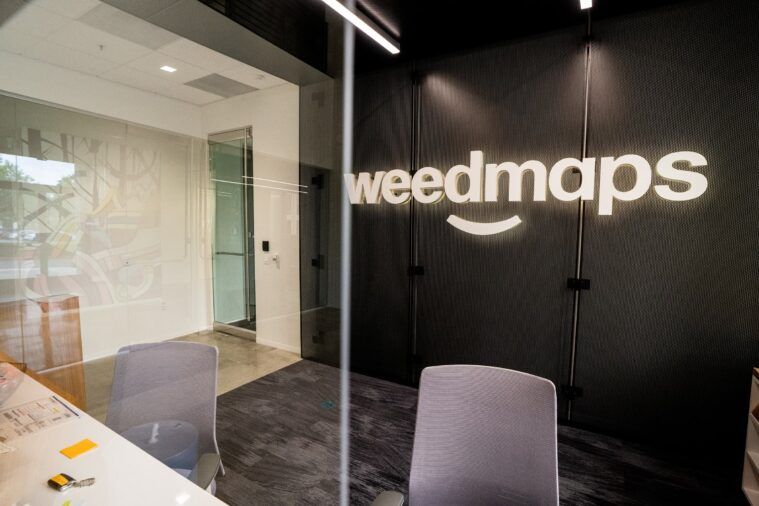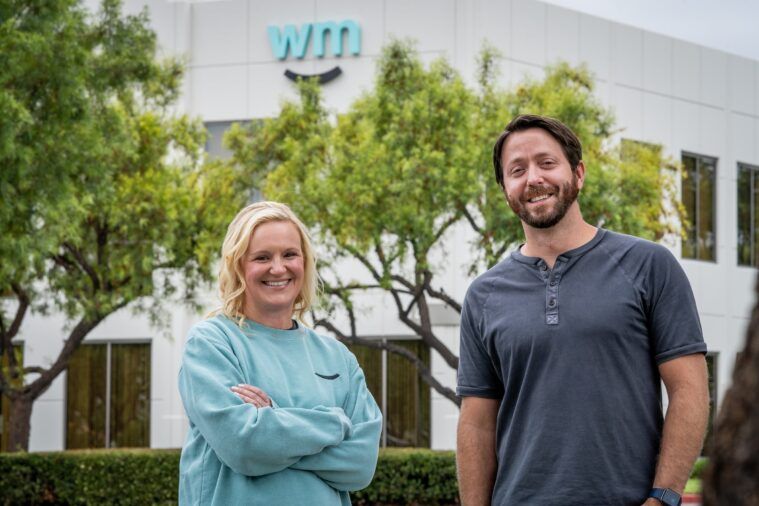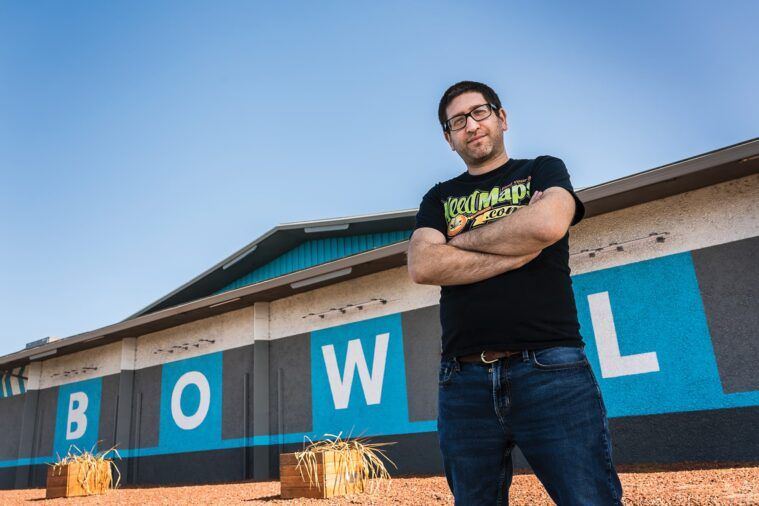When it comes to companies shaping the Cannabis industry, few, if any, loom larger than Weedmaps.
Long known to consumers as a premier online destination for finding and ordering Cannabis products in available markets across the United States and Canada, the truth is that few likely know the true scope and depth of this tech business started by co-founders Justin Hartfield and Keith Hoerling back in 2008.

Over the course of 13 years, Weedmaps has drastically expanded both its workforce as well as its ambitions. Now boasting a staff of over 600, the company’s headquarters in Irvine, California is currently complemented by offices in Tucson, New York, Denver, Toronto, and Barcelona. It is also the rare Cannabis-affiliated company to be publicly traded on the NASDAQ – another feather in the cap of a business that’s made a habit of leading by example.
In addition to constantly refining its offerings as a top-notch repository for consumers to find the products best suited for their needs, at a convenient location and for a reasonable price, Weedmaps has also become an indispensable resource to retailers – courtesy of its cutting-edge POS (point of sales) and eCommerce integration software.
Tasked with an ever-changing landscape of laws and regulations that vary not only by state but sometimes by city, the mammoth task Weedmaps undertakes as its primary mission is to create technology solutions that universally lower the barrier to entry into the industry, be it a newbie consumer ready to make their first purchase or a past victim of the war on drugs now eager to start fresh with a legal Cannabis enterprise.

According to CEO Chris Beals, who started with the company as legal counsel and was promoted to his current role in 2019, the mission of Weedmaps is a twofold proposition.
“On one side,” he explained, “we’re the largest marketplace for Cannabis consumers to discover, learn about and find different Cannabis products, and to then be able to purchase and do online ordering from retailers. Then the other side of the business is what we call the ‘business in a box’ – which is this growing suite of stuff that’s like Salesforce meets Shopify for Cannabis businesses.”
The latter set of tools includes a wide array of innovations, including POS integration (like the ability for retailers to embed their menus in their websites), as well as all of the compliance requirements that come with such undertakings (think pop-up disclaimers, age verification, and ID collection).
The company also offers its own POS system (WM Retail) available in Oklahoma and select other states, a wholesale exchange program (WM Exchange), and in August they launched an enhanced version of their iOS app with built-in ordering functionality.
Staying up-to-date on so many moving parts requires some serious in-house talent, which is why Beals estimates that over 40% of Weedmaps’ employees are currently focused on engineering, product, and design.
Among them are principal engineer Charlie King and software engineer Warren Applebaum. While King made what he terms “a full 180°” when he pivoted from doing government contract work to joining up with Weedmaps, Applebaum has been with the company for nearly 12 of its 13-year existence.
Reflecting on Weedmaps’ evolution over his long tenure with the company, Applebaum detailed how issues with listing medical-only dispensaries back in 2008 – eight years before California would approve Prop 64 – provided an early lesson in how things in the Cannabis industry can often change on a dime.

“Before the Obama Administration decided that the federal government would not pursue cases against state-legal medical marijuana dispensaries,” Applebaum said, “it would be this run around where the DEA or state and local authorities would shut down dispensaries, only for them to come back online like weeks later. Trying to keep up with that gave us a preview of what things were going to look like down the line years later.”
Nowadays, as each new state come online, Applebaum and his colleagues know to expect changes to these laws, and as a result, Weedmaps has heavily invested in compliance and government relations teams, so that they can be aware of what those regulations are going to look like and bake those elements into their applications to meet regulatory constraints.
Another vital element to Weedmaps’ operations concerns meeting consumer expectations when it comes to the shopping experience. That’s where King comes in.
“Consumers generally expect a certain level of service,” he explained. “They expect to be able to buy things online and then pick them up in-store, for example. Well, Cannabis has had to leapfrog into meeting those consumer expectations within an industry that’s highly regulated.”
Sure, it may seem simple to place an order via Weedmaps’ website or its app, but as King shared, the process behind the scenes to make such a transaction possible is actually profoundly complex.
“There’s a lot to it. We have to provide a compliant ordering system, make sure that you actually pick up the product, and then ensure that the data is reported to Metrc or whatever the compliance body may be. I think an average consumer might take a lot of that for granted, but the Cannabis industry has been forced to mature very quickly on some of these things to give that experience to consumers.”
Speaking with various members of the Weedmaps team, it’s abundantly clear that the complex minefield of compliance and geographically-specific regulations that collectively define the larger Cannabis industry in the U.S. remains one of the company’s chief areas of focus.
And no one arguably knows these challenges better than Bridget Hennessey, who leads Weedmaps’ Government Relations and Policy team.

“The work that we do on this team,” Hennessey shared, “is focused both on opening new markets, while also making sure that current markets are reflective of the community. We want to ensure that people who were negatively impacted by the war on drugs have a stake in these markets, so we spend a lot of our time advocating for social equity programs to be included in new legislation and ballot initiatives. Then we continue that work by making sure that we’re helping to educate people as an industry or market is coming to fruition and being implemented.”
Given the relatively well-defined status of markets located on the West Coast, Hennessy confirmed that much of her team’s focus is now directed towards the East Coast and other emerging industries in various pockets of the country. With a timeline for potential federal legalization still a rather murky prospect, she feels Weedmaps’ efforts to ensure states with current legal markets are diverse and easy-to-access has only become all the more important.
And that goes for those interested in leading the charge as well.
“We’re getting to develop the industry from the ground up,” Hennessey said. “And that means that everybody has an opportunity to be at the table from the beginning. For women and for minorities, I think that makes it a really interesting time to be in this industry and I encourage people of all walks of life to look into it and to try to see how they can be involved.”
Even Weedmaps itself is stepping up its efforts to reach the public with a message of de-stigmatization in the form of a new partnership with NBA superstar Kevin Durant and his startup, Thirty Five Ventures.
“I couldn’t have been happier with the way that came together,” CEO Chris Beals enthused when discussing the announcement.
A result of six months of thoughtful conversation between the two parties, the partnership – announced in August – also ultimately required looping in some of the top brass at the NBA before becoming official.
The result, which will align Weedmaps with one of basketball’s most acclaimed and influential players in a multi-year agreement, is reflective of the company’s renewed desire to lead by example when it comes to making the Cannabis industry a safer and more inclusive space.

“There are so many people who would love to reduce KD to just being some stoner guy who plays basketball,” Beals added, “but we’re talking about a generational talent here. KD is at the top of his game, so the fact that he is now involved in this makes it very hard for people to get out their stigma paintbrushes to try and dismiss it.”
Overall, this focus on normalization is one shared across Weedmaps’ various teams and leaders.
Be it normalizing the process of conducting Cannabis transactions in the retail space or normalizing the very concept of the plant for the public at large, solutions based on a hybrid of cutting-edge technology, relentless advocacy, and an internal desire to constantly improve, have proven Weedmaps to be a vital facet of the push to bring Cannabis to the mainstream.
“At the end of the day,” Beals noted, “this is simply about enabling an open and robust legal Cannabis system where there’s an opportunity for folks of all different backgrounds – including those who are arrested for Cannabis crimes – to come in and have opportunity to thrive.”










